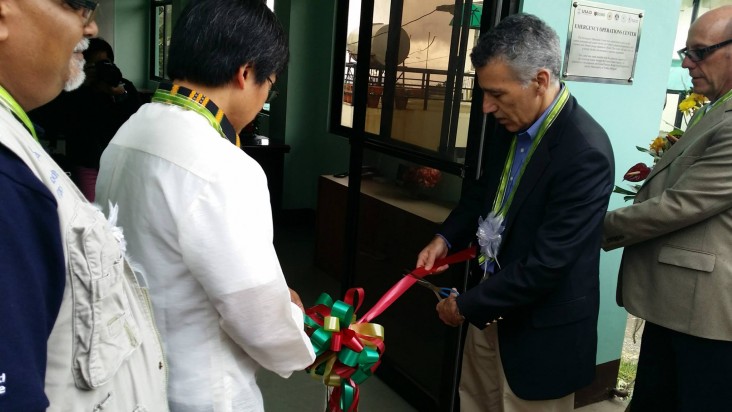
For Immediate Release
U.S. Ambassador to the Philippines Philip S. Goldberg visited Benguet Province from July 24 to July 25 to lead a series of activities that will further advance disaster risk reduction (DRR) and climate change adaptation measures in the region.
Benguet is one of the most vulnerable provinces to climate change in the Philippines. The province is highly exposed to typhoons, landslides, soil erosion, and drought.
U.S. Embassy Manila’s United States Agency for International Development (USAID) partnered with the World Food Programme (WFP) to implement a Disaster Risk Reduction and Response/Climate Change Adaptation program. The partnership aims to increase risk reduction initiatives in nine provincial governments, 23 municipal governments and eight cities outside Metro Manila by strengthening their capacity for climate change adaptation. The DRR Program is also working with seven academic institutions to introduce locally available and innovative solutions to address disaster risks and nine non-government organizations to do community-based disaster risk reduction interventions.
U.S. Ambassador Philip S. Goldberg said, “The U.S. government (USG) is committed to working with the Philippine Government to strengthen the capacity of communities to mitigate, prepare for, and respond to natural disasters and to increase resilience to global climate change.”
On July 24, Ambassador Goldberg travelled to Tublay to lead the ribbon-cutting ceremony of an Emergency Operations Center. With USG support, the Municipality of Tublay, along with several local government units, constructed Emergency Operations Centers that will serve as hubs for disaster management activities.
In addition, through the DRR program, the population of upland communities, particularly the women, received training and materials to pursue coffee farming as a means of livelihood. The coffee farming activity, which was designed to prevent landslides in Tublay, also helped boost the average income of women farmers.
The day’s event culminated with one-on-one interaction between Ambassador Goldberg and the women coffee farmers to discuss the impact of local DRR initiatives on their day-to-day lives.
On July 25, U.S. Embassy Deputy Chief of Mission Brian L. Goldbeck, along with the Governor of Benguet, Hon. Nestor B. Fongwan and municipal mayors, announced new USAID-funded grants in the amount of Php14.8 million (USD $340,000) to support DRR activities in five partner local government units in Benguet, as well as the University of the Philippines Baguio, and the local People’s Initiative for Learning and Community Development.
“These grants are intended to build the capacity of the awardees to implement high-impact solutions to minimize their communities’ exposure to the dangers of natural disasters. With this additional support, we hope to contribute to our collective commitment to help vulnerable communities save lives, properties, and livelihoods,” stated Goldbeck at the Provincial Capitol of Benguet in La Trinidad.
“In close coordination with the Philippine Government and under the Partnership for Growth, the United States and the Philippines are working to support communities to adapt to the impacts of climate change to help achieve more inclusive and resilient growth for Filipinos,” stated Mr. Reed Aeschliman, Deputy Mission Director, USAID/Philippines, who was present throughout the two-day series of events, alongside Praveen Agrawal, WFP Representative & Country Director and Onoura Daniels, WFP DRR Program Coordinator.
About USAID
The American people, through the United States Agency for International Development, have provided economic and humanitarian assistance worldwide for over 50 years. In the Philippines, USAID works in partnership with the national government in creating a more stable, prosperous and well-governed country through programs that foster sustainable and inclusive growth, strengthen governance and combat corruption, improve access to water, energy, health and education services, increase environmental resilience and natural resource management capabilities. For more information, visit http://www.usaid.gov/philippines or contact USAID/Philippines Development Outreach and Communications via email: infoph@usaid.gov.







Comment
Make a general inquiry or suggest an improvement.